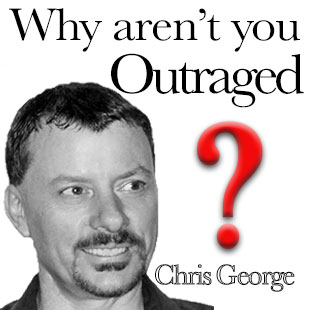
(CHRIS GEORGE / iNFOnews.ca)
May 15, 2018 - 12:00 PM
OPINION
“To be is to do.” — Socrates
“To do is to be.” — Sartre
“Do be do be do.” — Sinatra
Talking about the world around us can generate many reactions from people. A particularly interesting one is the question of what do I expect people to do if we aren't out frying off fossil fuels frivolously or consuming endless streams of plastic and electrons. It often includes the epithet "...you want us to sit in the street and eat mud pies. Look at Haiti. I've been there...", usually in response to the idea of cutting back on this, that, or the other.
This is an extremist position, used a diversionary tactic during a conversation. Showing restraint when it comes to polluting or living conservatively when it comes to consuming are seen as forcing ourselves into material poverty. Somehow our society has normalized the idea that happiness comes from a high income, lots of stuff, and flitting around the planet in the pursuit of whatever it is that the first two things didn't do for us.
People want to be happy. In this world of plenty, that often means more for us. Sometimes it means less for someone else; we are human after all. Happiness, like poverty, is relative. There are absolutes, of course. Abject poverty and depression are certainly things. But once people have had their basic needs met happiness becomes a primary goal, whether we are conscious of it or not. The answer to the question of what makes us happy is somewhat elusive, as there is no objective way to measure individual happiness.
Some say that more things won't make us happy, that beyond a certain level of material plenitude the addition of more stuff doesn't have the same impact on our happiness as the first bunch of stuff did. An interesting newer study on the matter points out that often it is the anticipation of getting the stuff that has the largest impact on our happiness and other researchers found that experiences and their anticipation rather than stuff gives us more bang for our buck.
This dichotomy between having and doing isn't new. My favorite book is entitled "To Have or To Be", by Erich Fromm. Written in 1976, it is an exploration of who we are as a species and how we could be on this planet. He points out that "having" and "being" are two divergent ways of living psychologically that have very different impacts on the ecosystem we live in. In this way the book is environmental activism, as people who are content to be have a much smaller footprint than people who seek to have ever increasing amounts of material goods.
The lust for things rather than relationship or experience has driven us apart as individuals. Families and communities simply aren't what they once were. We work more in order to have more. We spend more time with the things we own, in our own spaces. Our leisure time includes less bowling and more big screen movies in the basement. This social disconnection has consequences for our health, but also for the planet. Communities are less likely to tolerate polluters if people engage with one another in the social spaces where they live, rather than hiding in their tricked out caves.
Changing this would mean shifting from a having mode into a being mode. And that would mean setting new priorities. Instead of rewarding creative ways of converting living systems and fossil energy into more stuff, we need to find ways to reward people for improving our being. Education, art, music, literature; all things that historically required a patron, but also all things that can have a great impact on our happiness with little impact on the environment.
Do these things have value in today's world? Can we finds a way to put a higher price on the happiness of someone learning to sing just as we have for someone buying a trinket to play that song on? I think we can, and in the process we may find that there is an answer to what to do to make us happy if we cut back on the stuff a bit. Given the stark costs of unsustainable economic activity having more people involved in creating media and less people creating stuff can only be a good thing for us all.
— Chris George believes one measure of a just society is found in how well it balances fiscally conservative economics with social responsibility and environmental soundness in all of its living arrangements.
We welcome your comments and opinions on our stories but play nice. We won't censor or delete comments unless they contain off-topic statements or links, unnecessary vulgarity, false facts, spam or obviously fake profiles. If you have any concerns about what you see in comments, email the editor.
News from © iNFOnews, 2018